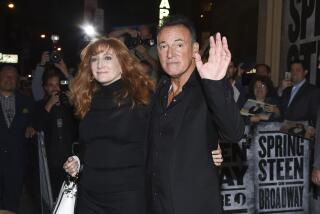Review: Bruce Springsteen & the E Street Band in Anaheim
This post has been updated. See note below for details.
When Bruce Springsteen & the E Street Band’s Wrecking Ball tour hit Kansas City, Mo., last month, they opened with Wilbert Harrison’s “Kansas City.” Two nights later in Denver, it was Bob Seger’s “Get Out of Denver” that got the show rolling.
As for the song Springsteen chose to open with in Anaheim on Tuesday night: “Land of Hope and Dreams.”
Who would have guessed?
But one of the defining aspects of any Springsteen concert is the way his music encourages listeners everywhere to connect with their own hometowns -- both celebrating their gifts and acknowledging their limitations -- thus making any and every town potentially a “Land of Hope and Dreams.”
On the flip side, his attention to how people deal when those hopes dwindle or those dreams go unrealized is what has turned Springsteen’s concerts into religious experiences for many.
FOR THE RECORD:
Bruce Springsteen: In the Dec. 6 Calendar section, a review of Bruce Springsteen’s concert Tuesday in Anaheim said that the line “It’s a town full of losers, I’m pulling out of here to win” is from the song “Born to Run.” It is from “Thunder Road.”
And the theme of loss has taken on a greater role in Springsteen’s life, and by turn in his music, playing a central part in Tuesday’s rich 3½-hour marathon. The show was part of his Wrecking Ball tour, which visited Los Angeles last spring.
Springsteen and the E Streeters have weathered a double shot, to borrow his phrase from “The E Street Shuffle,” which they resurrected Tuesday. There was the death last year of saxophonist Clarence Clemons and more recently, as with millions of others on the Eastern seaboard, the destruction inflicted on their hometowns by Superstorm Sandy.
Both were acknowledged during the show, not as passing references amid business as usual but as key elements of a new reality for them.
The 63-year-old rocker talked of the frustration of watching his adopted town of Asbury Park, N.J., struggle economically before experiencing a revitalization in the last decade, only to have much of its progress wiped away by Sandy.
That’s no reason, he told the sold-out crowd of 16,000 that packed the Honda Center to the rafters, to abandon hope. He used the story as his intro to “Wrecking Ball,” in which he defiantly challenges the forces of destruction: “Bring on your wrecking ball/Come on and take your best shot/Let me see what you’ve got.”
It was part of a four-song set he’s been doing most nights of the tour since Sandy hit that weaves together songs about community: “We Take Care of Our Own,” “Wrecking Ball,” “Death to My Hometown” and “My City of Ruins.”
Perhaps the more daunting loss to contend with is that of Clemons, his physically, musically and spiritually imposing right-hand man.
It says something about the place Clemons holds in E Street lore that it takes five new musicians to fill his mighty shoes: the E Street Horns, an instrumental squadron consisting of two saxophonists, two trumpeters and a trombonist led by Clemons’ nephew Jake Clemons. The latter did journeyman’s work in the unenviable task of re-creating his uncle’s greatest solos in “Born to Run,” “Badlands” and the rarely revisited epic “Jungleland.”
The transition into a new era of the E Street Band demonstrated two things: A great band truly is more than the sum of its parts, and a great musician can create an imprint that will long outlast his or her time on Earth.
Early on, during “My City of Ruins,” Springsteen interpolated the line from “Tenth Avenue Freeze-Out” -- “a change was made uptown” -- in reference to Clemons long before he played the latter at the show’s close. The line telegraphed his personal struggle with losing a brother and acknowledged the loss fans experienced with him.
It was one of many lines, some from songs, some extrapolated exhortations, he used as he shifted into preacher mode to drive home his sermons: “Are you ready to be transformed?” he asked repeatedly at the start; “Rise up!” he exhorted at another point in the show, and “Can you feel the spirit?” and “Take me higher” in others.
The power-packed finale of the 28-song show included “Born to Run,” “Dancing in the Dark,” “Santa Claus Is Coming to Town” and “Freeze Out.” Guest appearances by Southland rock heroes Tom Morello and Social Distortion’s Mike Ness (who sang his band’s “Bad Luck”) added adrenaline to the set.
But a 3½-hour Springsteen show circa 2012 has a decidedly different feel than those he delivered in the 1970s or ‘80s.
The visceral energy of long-gone youth is supplanted nowadays by the reflective, even meditative, aspects of grown-up life. That brought more multifaceted emotion to the de rigueur sing-along sections of “Thunder Road” (“It’s a town full of losers, I’m pulling out of here to win”) and “Badlands” (“I believe in the faith that could save me/I believe in the hope and I pray that some day it will raise me”).
The result is an experience equally and potentially more powerful than this force of nature conjured in his days of yore.
Who would have guessed?
ALSO:
First thoughts from new Rock Hall chief Greg Harris
E! to air special before Rolling Stones’ pay-per-view concert
Bruce Springsteen returns to Los Angeles with a ‘Dream’ tour
Follow Randy Lewis on Twitter: @RandyLewis2
More to Read
The biggest entertainment stories
Get our big stories about Hollywood, film, television, music, arts, culture and more right in your inbox as soon as they publish.
You may occasionally receive promotional content from the Los Angeles Times.










